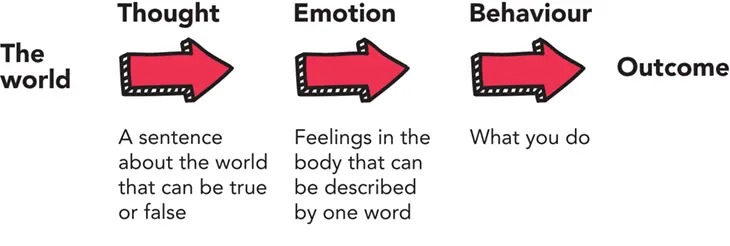anxious
worried
aversion
ashamed
powerless
despair
guilty
judgemental
hesitant
apathetic
inferior.
In your body, you might feel some of these emotions as a tightness in your chest, a clenched jawline or hunched shoulders.
If that's you, take another moment right now to just breathe for a second. Go on. Deep breath in … and out.
Relax your shoulders away from your ears; now your jaw, letting your tongue drop away from the roof your mouth.
There, isn't that better?
Go on, take another deep breath on me. They're completely free, I promise.
Now I want you to know that all these feelings you feel about money are very common and very normal. I have felt them too.
But what if I told you there was also another way to feel about money?
What if I told you it is possible, instead, to feel peaceful, hopeful, optimistic, courageous, confident, proud and liberated?
Sound too good to be true?
It's not. These are words I now feel when I think about money. I know others feel them too.
It turns out we can alter the emotions we feel about something. And in chapter 2, we're going to work through transforming the emotions you feel about your money.
But we have to do some more detective work first.
Where do emotions come from?
You see, emotions don't just arise out of nowhere. They are the body's and mind's reaction to the world around us and — even more explicitly — the thoughts and beliefs that we have about that world.
These can be thoughts you aren't even consciously aware of; they're just thoughts swimming in the social soup you've been fed all your life from society, governments, media, your family and friends.
Often we're not even aware we're having a specific thought. Sometimes, we're just having so many thoughts in such rapid succession, it's too hard to pinpoint one in particular.
But I promise you, if you are having a strong emotion, it is being driven by a thought you are also having.
Luckily, there is an ingenious way to identify thoughts and distinguish them from emotions.
Emotions can be summarised in one word — for example, ‘fear’, ‘joy’ or ‘sadness’.
Thoughts, by contrast, come in sentence form — for example, ‘I am going to fail the test’; ‘Nobody likes me’; ‘I will never be able to own a home’.
Logic decrees that there can only be so many words to describe emotions, which is why it's often easier to try identifying them before thoughts.
Thoughts — comprising of a string of words — exist in almost infinitely more variety, so catching yourself in the process of having a specific thought can be very difficult. But necessary if you want to be able to choose to think another thought that could, in turn, drive a different — perhaps more pleasurable — emotional state.
Because here's the thing. Thoughts are not facts.
They certainly can be. ‘I think the sky is blue’ is both a thought and a fact. But ‘I think my friend didn't text me back because they don't like me and I am a worthless person' — while certainly a thought you could have — is not a fact.
Why is that not a fact? Well, first, because no human is worthless. But also because it could just as easily be the case that your friend not texting you back, in fact, had nothing to do with you. They lost their phone. They are in a meeting. Or they simply don't have the mental capacity to reply.
What we choose to think about a given situation matters because the emotional state it creates will, ultimately, drive our actual behaviour.
If you feel scared, you will likely run away, if possible.
If you feel guilty, you will seek to hide.
If you feel rejected, you might sit on the couch all night ordering Uber Eats.
Here is a helpful chart I made to summarise this thought‐emotion‐behaviour chain of causation.

Now let's apply it to the real‐world scenario of a friend not texting you back.
If your thought is that they didn't text because they don't like you, this might lead you to feel a combination of sadness, inferiority and rejection. It might lead you to the behaviour of withdrawing from your friend, or sending them a series of disgruntled and hostile messages demanding they explain themselves. Outcome? That friendship may disintegrate.
But what if you chose a different thought? What if you chose the thought that your friend is probably overwhelmed by something else in their life and that they will respond when they can. You might feel disappointed, but you might also feel peaceful and loving towards your friend. The behaviour this drives might be to simply give them the space they need, or maybe to follow up later with a brief message expressing your hope that they are well. Outcome? You may very well deepen or cultivate your friendship further.
Critically, by carefully selecting your thought in this example, you can not only avoid a distressing emotional state yourself, but also better the outcomes in your life.
Being able to identify both your emotions and underlying thoughts — and ultimately choose more accurate or helpful thoughts — is an invaluable life skill and one we are not often taught in school. It takes practice. If you can afford it, I highly recommend doing this work with a trained professional.
But you've paid good money for this book on the promise it will make you better at money, so let me do some of the hard ‘thought identifying’ work for you — at least when it comes to your relationship with money.
For those of you whose emotional response is to feel fear, powerlessness or apathy about money, I have some good news!
The thoughts you are having about money are very likely false. It is possible for you to think new and better thoughts about money.
In chapter 2, I debunk seven of the most common money myths I've encountered. I also lay out seven new thoughts about money for you to consider.
Not only do I think these new thoughts will be more helpful to you, I also happen to believe they are true.
Now isn't that a nice thought?
Let's go.
Конец ознакомительного фрагмента.
Текст предоставлен ООО «ЛитРес».
Прочитайте эту книгу целиком, купив полную легальную версию на ЛитРес.
Безопасно оплатить книгу можно банковской картой Visa, MasterCard, Maestro, со счета мобильного телефона, с платежного терминала, в салоне МТС или Связной, через PayPal, WebMoney, Яндекс.Деньги, QIWI Кошелек, бонусными картами или другим удобным Вам способом.













